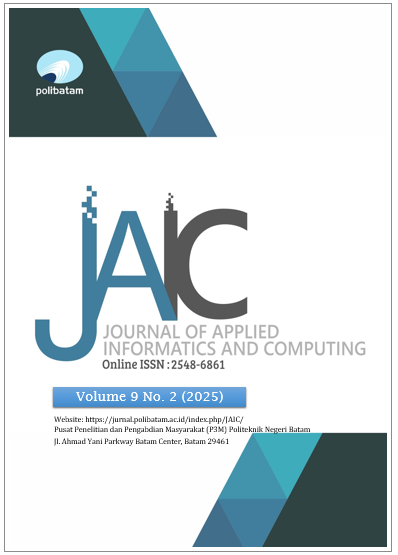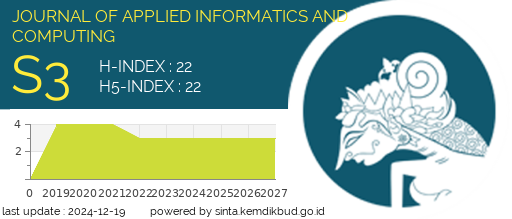Development of an IoT-Based Mobile Plastic Shredder for Optimized Waste Management in Batam
DOI:
https://doi.org/10.30871/jaic.v9i2.9208Keywords:
Environmental Technology Innovation, Internet of Things (IoT), Plastic Waste, Plastic Shredder Machine, Waste ManagementAbstract
Plastic waste management has become a critical environmental issue, with its improper handling leading to severe ecological and health impacts. This research addresses the challenge by designing and developing an IoT-based mobile plastic shredding machine aimed at improving waste management efficiency, particularly in Batam City, Indonesia. Utilizing Borg and Gall’s R&D framework, this study integrates IoT technology to enhance the machine’s functionality, enabling real-time data collection and remote monitoring through mobile applications. The machine comprises three functional levels: a storage area for raw plastic bottles, a shredding unit with proximity sensors, and a post-shredding storage compartment. Key innovations include weight sensors for automatic material handling and real-time data transmission via the Blynk IoT platform, controlled by an Arduino microcontroller. The modular design ensures portability, easy maintenance, and adaptability for use in various locations, including coastal areas. Prototyping involved integrating proximity sensors, load cells, relays, and motor control systems to ensure smooth operation. The machine demonstrated consistent performance during testing, with its IoT features enabling remote control and monitoring via smartphones. This facilitates optimized waste collection and contributes to reducing environmental pollution caused by plastic waste. The IoT-based mobile plastic shredding machine not only enhances waste management efficiency but also supports sustainability goals. Its portability and environmentally friendly design make it a practical solution for managing plastic waste in underserved areas. This innovation provides a significant step toward addressing the global plastic waste crisis, aligning with technological advancements to promote sustainable waste management practices.
Downloads
References
[1] B. A. Nurfitriyani, “Socialization and Training of Vertical Garden Making to Overcome Waste Problems in Mojosari Village, Kalitidu,” J. Layanan Masy. (Journal Public Serv., vol. 5, no. 1, p. 201, 2021, doi: 10.20473/jlm.v5i1.2021.201-211.
[2] F. I. Jamika, “Dampak Pencemaran Mikroplastik Di Wilayah Pesisir Dan Kelautan,” J. Pasir Laut, vol. 7, no. 1, pp. 1–5, 2023, doi: 10.14710/jpl.2023.51132.
[3] D. Ahidin, S. Nur Rohmah, A. Rahma, and S. Eka Sari, “Ecobrick : Solusi Kreatif Dalam Pengurangan Limbah Plastik Pada Era Modern Di Desa.,” vol. 1, no. 1, pp. 37–42, 2023, doi: 10.32534/jsikap.v1i1.4822.
[4] L. Persson et al., “Outside the Safe Operating Space of the Planetary Boundary for Novel Entities,” Environ. Sci. Technol., vol. 56, no. 3, pp. 1510–1521, 2022, doi: 10.1021/acs.est.1c04158.
[5] T. Roy, T. K. Dey, and M. Jamal, “Microplastic/Nanoplastic Toxicity in Plants: An Imminent Concern,” Environ. Monit. Assess., vol. 195, no. 1, 2022, doi: 10.1007/s10661-022-10654-z.
[6] M. MacLeod, H. P. H. Arp, M. B. Tekman, and A. Jahnke, “The Global Threat From Plastic Pollution,” Science (80-. )., vol. 373, no. 6550, pp. 61–65, 2021, doi: 10.1126/science.abg5433.
[7] M. Rai et al., “Microplastic Pollution in Terrestrial Ecosystems and Its Interaction With Other Soil Pollutants: A Potential Threat to Soil Ecosystem Sustainability,” Resources, vol. 12, no. 6, p. 67, 2023, doi: 10.3390/resources12060067.
[8] N. Nurhayati, A. Thaib, A. Miranda, C. Fitriyanti, and L. Handayani, “Edukasi Bahaya Sampah Plastik Terhadap Ekosistem Perairan Pada Siswa Kelas I Min 32 Kecamatan Mesjid Raya Kabupaten Aceh Besar,” Al Ghafur J. Ilm. Pengabdi. Kpd. Masy., vol. 2, no. 2, pp. 208–214, 2023, doi: 10.47647/alghafur.v2i2.1829.
[9] N. Auliyah et al., “Pemanfaatan Limbah Gelas Plastik Sebagai Bahan Dasar Pembuatan Paving Block Di Desa Mootilango,” vol. 5, no. 1, 2023, doi: 10.32662/insancita.v5i1.2173.
[10] B. Basuki and Darmanijati, “Pemanfaatan Limbah Plastik Bekas Untuk Bahan Utama Pembuatan Paving Block,” J. Rekayasa Lingkung., vol. 18, no. 1, 2020, doi: 10.37412/jrl.v18i1.20.
[11] S. Sun and W. Huang, “Chemical Upcycling of Polyolefin Plastics Using Structurally Well-Defined Catalysts,” Jacs Au, vol. 4, no. 6, pp. 2081–2098, 2024, doi: 10.1021/jacsau.4c00289.
[12] Y. Peng, A. Prabhu, and C. Rinke, “Facing Our Plastic Waste Crisis: Biorecycling as a Promising Solution,” Microbiol. Aust., vol. 44, no. 1, pp. 52–56, 2023, doi: 10.1071/ma23013.
[13] Ž. Stasiškienė et al., “Challenges and Strategies for Bio-Based and Biodegradable Plastic Waste Management in Europe,” Sustainability, vol. 14, no. 24, p. 16476, 2022, doi: 10.3390/su142416476.
[14] I. A. Husain and D. Hertati, “Implementasi Kebijakan Pengurangan Penggunaan Kantong Plastik,” J. Kebijak. Publik, vol. 14, no. 2, p. 233, 2023, doi: 10.31258/jkp.v14i2.8248.
[15] F. Fuady, “Peran Perguruan Tinggi Dalam Proses Pembangunan Bidang Kesejahteraan Sosial,” J. Ilm. Multidisiplin, vol. 1, no. 06, pp. 30–37, 2022, doi: 10.56127/jukim.v1i06.318.
[16] A. Zumira and H. K. Surtikanti, “Solusi Pengelolaan Sampah Plastik: Pembuatan Ecobrick Di Kelurahan Agrowisata, Kota Pekanbaru, Provinsi Riau,” vol. 1, no. 1, 2023, doi: 10.61511/ecoprofit.v1i1.2023.140.
[17] N. Atika Juhaedah Alifah, N. Febriansyah, N. Leni June Murliani, and N. Tosha Tojaya, “Pengelolaan Sampah Plastik Menjadi Ekobrik Untuk Mencegah Pencemaran Sampah Mikroplastik Yang Ada Di Desa Mekarasih,” J. Abdi Nusa, vol. 3, no. 3, pp. 164–170, 2023, doi: 10.52005/abdinusa.v3i3.195.
[18] D. Misra, G. Das, T. Chakrabortty, and D. Das, “An IoT-based Waste Management System Monitored by Cloud,” J. Mater. Cycles Waste Manag., vol. 20, no. 3, pp. 1574–1582, 2018, doi: 10.1007/s10163-018-0720-y.
[19] T. A. Khoa et al., “Waste Management System Using IoT-Based Machine Learning in University,” Wirel. Commun. Mob. Comput., vol. 2020, pp. 1–13, 2020, doi: 10.1155/2020/6138637.
[20] T. Bányai, P. Tamás, B. Illés, Ž. Stankevičiūtė, and Á. Bányai, “Optimization of Municipal Waste Collection Routing: Impact of Industry 4.0 Technologies on Environmental Awareness and Sustainability,” Int. J. Environ. Res. Public Health, vol. 16, no. 4, p. 634, 2019, doi: 10.3390/ijerph16040634.
[21] B. E. Purwandari, S. Supriyatin, and R. H. Ristanto, “The Development of Creative Thinking and Problem-Solving Skill Instrument of Plant Growth in High School,” Biosfer, vol. 15, no. 2, pp. 302–312, 2022, doi: 10.21009/biosferjpb.26535.
[22] K. A. Aka, “Integration Borg &Amp; Gall (1983) and Lee &Amp; Owen (2004) Models as an Alternative Model of Design-Based Research of Interactive Multimedia in Elementary School,” J. Phys. Conf. Ser., vol. 1318, no. 1, p. 12022, 2019, doi: 10.1088/1742-6596/1318/1/012022.
[23] Oliveira M, Silva GD e, Zancul E. Design and Early Evaluation of a Device to Improve the Sharp Count Process in Operating Rooms. Surg Innov. 2023;30(5):672–5.
[24] Liu S, Chen X. MedDiet Adherence Score for the Association Between Inflammatory Markers and Cognitive Performance in the Elderly: A Study of the NHANES 2011–2014. BMC Geriatr. 2022;22(1).
[25] He Y. Automatic Blood Cell Detection Based on Advanced YOLOv5s Network. Ieee Access. 2024;12:17639–50.
[26] Zhang W, Zhang C, Lu D, Nie J, Hu Z, Xian C, et al. The Mediation Effect of Systemic Immunity Inflammation Index Between Urinary Metals and TOFAT Among Adults in the NHANES Dataset. Sci Rep. 2024;14(1).
[27] Warguła Ł, Kukla M, Krawiec P. Directions of Development of Adaptive Systems to the Operating Conditions of Mobile Wood Chopping Machines With Low Power Engines. Matec Web Conf. 2022;357:4002.
[28] Wong JH, Gan M, Chua BL, Gakim M, Siambun NJ. Shredder Machine for Plastic Recycling: A Review Paper. Iop Conf Ser Mater Sci Eng. 2022;1217(1):12007.
[29] Wong JH, Karen WMJ, Bahrin SA, Chua BL, Melvin GJH, Siambun NJ. Wear Processes and Performance of Blade Pair in Small‐scale Single‐shaft Plastic Shredder Machine. Materwiss Werksttech. 2023;54(6):725–36.
[30] Mustofa I, Azhari FM, Rahmahima BA. Socialization of the Sustainable Construction Management Budget Through Community Service in the Mekarsari Boarding House Construction Project. Cived. 2024;11(1):135–43.
[31] Galvão DM, Cezár-Vaz MR, Xavier DM, Penha JGM, Lourenção LG. Hospital Sustainability Indicators and Reduction of Socio-Environmental Impacts: A Scoping Review. Rev Da Esc Enferm Da Usp. 2023;57.
[32] Glišić M, Veluri B, Ramanujan D. A Bottom-Up Methodology for Identifying Key Performance Indicators for Sustainability Monitoring of Unit Manufacturing Processes. Sustainability. 2024;16(2):806.
[33] Balzannikov M. Directions of Improvement of Massive Hydraulic Retaining Structures. E3s Web Conf. 2023;376:3009.
[34] Maharlika F. Economic Aspects of Pandan Fiber Furniture From the Area of Sustainable Design Philosoph. Proceeding Int Conf Bus Econ Soc Sci Humanit. 2022;3:567–78.
[35] Malyemez C, Baykoç ÖF. Multi-Objective Optimisation of Spare Parts Allocation and Level of Repair Analysis in Performance-Based Logistics. Aeronaut J. 2022;126(1301):1210–21.
[36] Busari RA, Alabi KP, Adebayo RK, Dada J. Rapid Composting Using a Novel Agricultural Waste Shredder. Fuoye J Eng Technol. 2024;9(1):1–6.
[37] Jalisa AB, Wong JH, Karen WMJ, Liew WYH, Chua BL, Siambun NJ, et al. Evaluation on the Performance and Wear of Blades in a Small‐sized High‐density Polyethylene Shredder. Materwiss Werksttech. 2024;55(10):1426–36.
Downloads
Published
How to Cite
Issue
Section
License
Copyright (c) 2025 Ansarullah Lawi, Aulia Agung Dermawan, Dwi Ely Kurniawan , Yuni Roza, Thania Ardilla, Jaswin .

This work is licensed under a Creative Commons Attribution-ShareAlike 4.0 International License.
Authors who publish with this journal agree to the following terms:
- Authors retain copyright and grant the journal right of first publication with the work simultaneously licensed under a Creative Commons Attribution License (Attribution-ShareAlike 4.0 International (CC BY-SA 4.0) ) that allows others to share the work with an acknowledgement of the work's authorship and initial publication in this journal.
- Authors are able to enter into separate, additional contractual arrangements for the non-exclusive distribution of the journal's published version of the work (e.g., post it to an institutional repository or publish it in a book), with an acknowledgement of its initial publication in this journal.
- Authors are permitted and encouraged to post their work online (e.g., in institutional repositories or on their website) prior to and during the submission process, as it can lead to productive exchanges, as well as earlier and greater citation of published work (See The Effect of Open Access).











